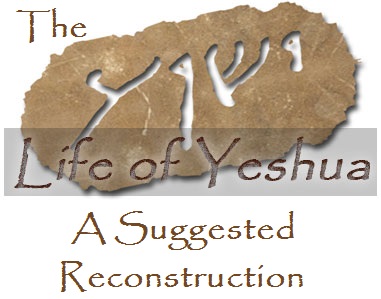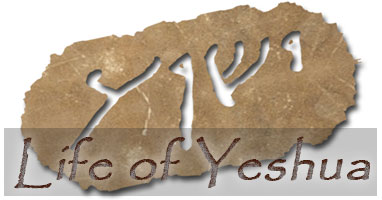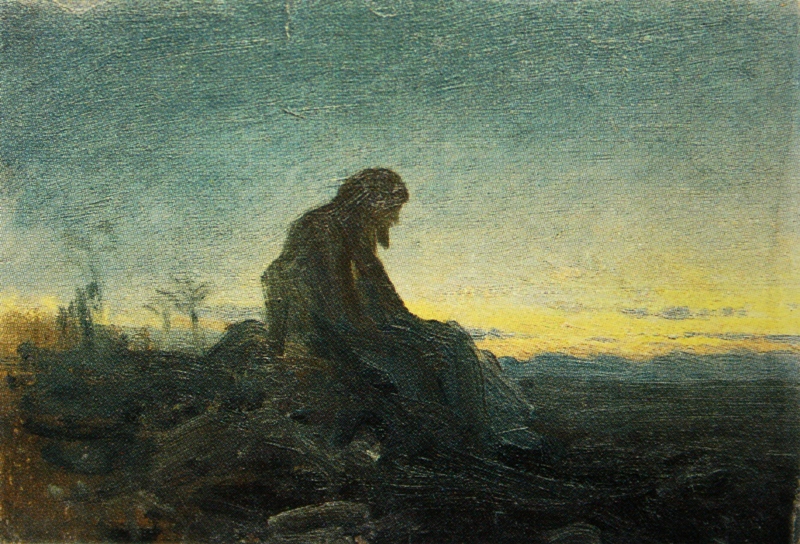Matt. 4:1-11; Mark 1:12-13; Luke 4:1-13
(Huck 8; Aland 20; Crook 23)[1]
Updated: 18 November 2023
וְיֵשׁוּעַ מָלֵא רוּחַ קֹדֶשׁ שָׁב מִן הַיַּרְדֵּן וַיִּתְהַלֵּךְ בָּרוּחַ בַּמִּדְבָּר אַרְבָּעִים יוֹם וַיִּתְנַסֶּה בַּשָּׂטָן וְלֹא אָכַל מְאוּמָה בַּיָּמִים הָהֵם וַיְכֻלּוּ וַיִּרְעַב וַיִּקְרַב הַשָּׂטָן וַיֹּאמֶר לוֹ אִם בֵּן אַתָּה לֵאלֹהִים אֱמֹר לָאֶבֶן הַזּוֹ וְתִּהְיֶה לְלֶחֶם וַיַּעַן יֵשׁוּעַ וַיֹּאמֶר כָּתוּב כִּי לֹא עַל הַלֶּחֶם לְבַדּוֹ יִחְיֶה הָאָדָם וַיַּעֲלֵהוּ אֶל הַר גָּבֹהַּ מְאֹד וַיּוֹרֵהוּ אֶת כָּל מַמְלְכוֹת הָאָרֶץ וְאֶת כֹּל כְּבוֹדָן וַיֹּאמֶר לוֹ אֶת כֻּלָּם לְךָ אֶתֵּן אִם תִּתְנַפֵּל לְפָנַי וַיַּעַן יֵשׁוּעַ וַיֹּאמֶר לוֹ כָּתוּב אֶת יי אֱלֹהֶיךָ תִּירָא וְאוֹתוֹ לְבַדּוֹ תַעֲבֹד וַיֹּלֶךְ אוֹתוֹ יְרוּשָׁלַיִם וַיַּעֲמִדֵהוּ עַל כְּנַף הַמִּקְדָּשׁ וַיֹּאמֶר לוֹ אִם בֵּן אַתָּה לֵאלֹהִים הַפֵּל אֶת עַצְמְךָ [מִזֶּה] לְמַטָּה שֶׁכָּתוּב כִּי מַלְאָכָיו יְצַוֶּה לָּךְ וְעַל כַּפַּיִם יִשָּׂאוּנְךָ פֶּן תִּגֹּף בָּאֶבֶן רַגְלֶךָ וַיַּעַן וַיֹּאמֶר לוֹ יֵשׁוּעַ נֶאֱמַר לֹא תְנַסּוּ אֶת יי אֱלֹהֵיכֶם וַיְכַל הַשָּׂטָן כֹּל נִסָּיוֹן וַיָּסַר מִמֶּנּוּ [וְהִנֵּה מַלְאָכִים קָרְבוּ וַיְשָׁרְתוּ אוֹתוֹ]
Having been filled with the Holy Spirit, Yeshua turned from the Yarden, and in the Spirit he walked in the desert for forty days. He was tempted by Satan, and he did not eat anything in all that time. When those days were over he was famished.
Then Satan approached Yeshua and said, “If you really are God’s son, command this hunk of rock to become bread.” But Yeshua replied, “It is written, People do not live on bread alone [Deut. 8:3].”
So Satan took Yeshua up a very high mountain and showed him all the kingdoms of the earth and all their glory. Then Satan said to Yeshua, “All of them I will give you if you will worship me.” But Yeshua replied, “It is written, Fear the LORD your God, and worship him alone [Deut. 6:13; 10:20].”
So Satan led Yeshua into Yerushalayim, set him on a wing of the Temple, and said to him, “If you really are God’s son, throw yourself down from this spot, since it is written, For he will command his angels concerning you so that they will lift you up in their arms, lest you strike your foot against a stone [Ps. 91:11, 12].” But Yeshua replied, “Scripture says, You must not test the LORD your God [Deut. 6:16].”
When Satan had concluded every temptation he left Yeshua alone [but angels came to Yeshua and served him].[2]
| Table of Contents |
|
3. Conjectured Stages of Transmission 5. Comment 8. Conclusion |
 .
.
.
.
.
Reconstruction
To view the reconstructed text of Yeshua’s Testing click on the link below:
Paid Content
Premium Members and Friends of JP must be logged in to access this content: Login
If you do not have a paid subscription, please consider registering as a Premium Member starting at $10/month (paid monthly) or only $5/month (paid annually): Register
One Time Purchase Rather Than Membership
Rather than purchasing a membership subscription, you may purchase access to this single page for $1.99 USD. To purchase access we strongly encourage users to first register for a free account with JP (Register), which will make the process of accessing your purchase much simpler. Once you have registered you may login and purchase access to this page at this link:
Conclusion
In Yeshua’s Testing Satan pressured Jesus to take advantage of his divine sonship by eluding suffering, amassing power and making himself the focus of a cult of personality. In each instance Jesus quoted Scripture to the effect that divine sonship is defined not by privilege or the exercise of power but by humble obedience to the Torah’s commandments.
 Click here to return to The Life of Yeshua: A Suggested Reconstruction main page.
_______________________________________________________
Click here to return to The Life of Yeshua: A Suggested Reconstruction main page.
_______________________________________________________
- [1] For abbreviations and bibliographical references, see “Introduction to ‘The Life of Yeshua: A Suggested Reconstruction.’” ↩
- [2] This translation is a dynamic rendition of our reconstruction of the conjectured Hebrew source that stands behind the Greek of the Synoptic Gospels. It is not a translation of the Greek text of a canonical source. ↩
































































































